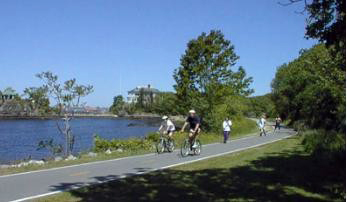The recent $37 million cut to funding for the state Transportation Alternative Program has some lawmakers worried that the move sets a precedent that could lead to future underfunding.
The cuts, approved by the State Planning Council last week, were part of an amendment to the 10-year State Transportation Improvement Program, which includes TAP.
The R.I. Department of Transportation says that the $37 million does not undercut all of the projects TAP was designed to bring to fruition. Some of the money was transferred for use on bicycle infrastructure to be overseen by different agencies or included in other projects. And about $24 million was pulled on work that has been deferred or completed.
While the funding shift elicited opposition from more than 30 state senators who signed a letter of protest, RIDOT says bicycle and pedestrian safety measures and byways remain a priority.
“We are baking these pathways into our major projects. They are in the Providence River Pedestrian Bridge Project, in the 6/10 Interchange and in the Henderson Bridge Project, amongst others,” RIDOT said in a statement. “All these projects provide bikeways not only for recreation, but more importantly for urban dwellers who will use them to get to their jobs, thus providing an economic-development benefit.”
About $80 million for bike projects is included in the decadelong STIP, along with $120 million over a decade in TAP, said RIDOT spokesman Charles St. Martin.
“We are making about $200 million worth of investments over 10 years … more than twice the level we did previously,” St. Martin said.
Still, many in the legislature aren’t convinced.
Moving TAP funds potentially dilutes the program’s effectiveness, said Sen. Dawn Euer, D-Newport. She cited a 2017 report that includes TAP funding requests for nearly 40 projects across the state.
“I’m all for saving money, but there needs to be transparency and accountability that goes along with that,” she said.
She and other lawmakers say that cuts to the 10-year plan, which extends to 2027, could affect the state’s ability to attract forward-thinking companies.
“Companies know that their talent pool prefers walking, biking and public transportation, and will consider comprehensive transportation networks when they select office locations,” says a letter written by Euer and Sen. William J. Conley Jr., D-East Providence.
State planners are in the midst of finalizing a 20-year transportation plan that includes a segment devoted to biking infrastructure, including bicycling paths and marked bicycle routes along roadways primarily in the eastern part of the state.
But it’s too soon to talk about specifics, according to the state’s Division of Planning.
“Given that this process is still ongoing, it’s a bit premature for us to discuss the state’s long-term vision in detail,” said Brenna McCabe, spokeswoman for the R.I. Department of Administration.
Elizabeth Graham is a PBN staff writer. Contact her at Graham@PBN.com.












